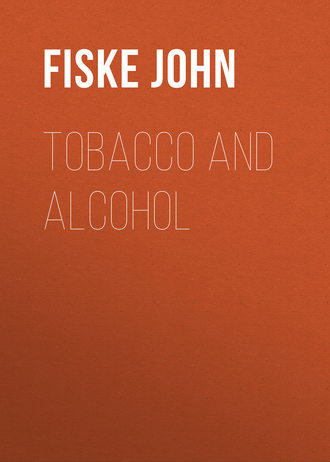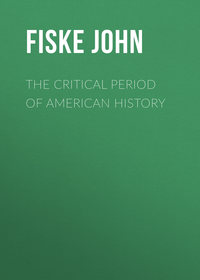 полная версия
полная версияTobacco and Alcohol
There are consequently four ways in which tobacco may exhibit its effects upon the nutrition of the body.
I. In stimulant doses, by improving nutrition, it may increase the normal weight.
II. In stimulant doses, by improving nutrition, it may cause a diminution of weight abnormally produced.
III. In narcotic doses, by impairing nutrition, it may cause emaciation.
IV. In narcotic doses, by impairing nutrition, it may aggravate obesity instead of relieving it.24
We may see, by this example, how much room is always left for fallacy in the empirical tracing of physiological effects to their causes. The phænomena are so complex that induction is of but little avail, unless supported and confirmed by deduction.25 In the case of tobacco, our conclusions are so confirmed. Deduction, supported by cautious induction, shows the stimulant action of tobacco to be of permanent benefit to the system; and hence the statements of those smokers who believe themselves injured by the habit must be received with due qualifications. Yielding unsuspiciously to the influence of a prejudice which originated in an absurd puritanical notion of "morality,"26 many smokers are in the habit of reviling the practice which they nevertheless will not abandon. Having once begun to smoke, they persist in laying to the account of tobacco sundry aches and ails which in the hurry and turmoil of modern life no one can expect wholly to escape, and many of which are such as tobacco could not possibly give rise to. If their teeth, for instance, begin to decay, tobacco gets the blame, although it is notorious to dentists that tobacco preserves the enamel of the teeth as hardly anything else will. We have seen teeth which had been kept for months in a preparation of nicotine and were in excellent condition. Then the headache, due perhaps to an overdose of hot risen biscuit or viands cooked in pork-fat, is quite likely to be laid to the charge of the general scape-goat; although to produce a headache directly by means of tobacco requires a powerful narcotic dose.27 One of the chief causes of ordinary headache is doubtless the use of the execrable anthracite which Pennsylvania protectionists force upon us by means of their unrighteous prohibitory tariff upon English coal.28 We have even heard it alleged that smoking impairs the eyesight. Students smoke much, and are nearsighted, is the complacent argument – it being apparently forgotten that sailors smoke much and are far-sighted, and that in each case the result is due to the way in which the eyes are used.
Before leaving this subject, it may be well to allude to Mr. Parton's remarks (p. 35) about "pallid," "yellow," "sickly," and "cadaverous," tobacco-manufacturers. He evidently means to convey the impression that workers in tobacco are more unhealthy than other workmen. Upon this point we shall content ourselves with transcribing the following passage from Christison, On Poisons, p. 731: – "Writers on the diseases of artisans have made many vague statements on the supposed baneful effects of the manufacture of snuff on the workmen. It is said they are liable to bronchitis, dysentery, ophthalmia, carbuncles, and furuncles. At a meeting of the Royal Medical Society of Paris, however, before which a memoir to this purport was lately read, the facts were contradicted by reference to the state of the workmen at the Royal Snuff Manufactory of Gros-Caillou, where 1000 people are constantly employed without detriment to their health. (Revue Médicale, 1827, tom. III. p. 168.) This subject has been since investigated with great care by Messrs. Parent-Duchatelet and D'Arcet, who inquired minutely into the state of the workmen employed at all the great tobacco-manufactories of France, comprising a population of above 4000 persons; and the results at which they have arrived are, – that the workmen very easily become habituated to the atmosphere of the manufactory, – that they are not particularly subject either to special diseases, or to disease generally, – and that they live on an average quite as long as other tradesmen. These facts are derived from very accurate statistical returns. (Annales d'Hygiène, 1829, tom. I. p. 169.)" The reader may also consult an instructive notice in Hammond's Journal of Psychological Medicine, Oct. 1868, vol. II. p. 828.
These examples show with what well-meaning recklessness people find fault with anything which they are at all events bound to condemn. It is not to be denied, however, that many persons are continually hurting themselves by the flagrant abuse of tobacco. Many men are doubtless in a state of chronic tobacco-narcosis; just as many men and women keep themselves in a state of chronic narcosis from the abuse of tea and coffee. Probably three-fourths of the ill-health which afflicts the community is due to barbarous neglect of the plainest principles of dietetics. When a thing tickles the palate, or refreshes the nervous system, people do not seem to be as yet sufficiently civilized to let it go until they have made themselves miserable with it. Half the inhabitants of the United States, says Mr. Parton, violate the laws of nature every time they go to the dinner-table. He might safely have put the figure higher. Owing to the shortcomings of our present methods of education, we rarely get taught physiology at school or college, we never thoroughly learn the principles of hygiene, or if we acquire some of them by hearsay, we seldom realize them in such a way as to shape our behaviour accordingly. It is not to be wondered at, therefore, that people eat imprudently and smoke imprudently. They smoke just before dinner, they smoke rank, badly-cured tobacco, they smoke much, and they smoke fast, thus narcotizing instead of stimulating their nervous systems. A plum-pudding is good and nourishing, but it would hardly be wise to eat it before meat, or to eat it to the verge of nausea.
This lesson of dosage is one which cannot be learned too thoroughly. The would-be reformer says, "Touch not the unclean thing;" but the reply is, "No hurt has ever yet come to me from smoking: I will therefore smoke all the more, to confute these idle crotchets." This is the very crudity of undisciplined inference. In physiology we cannot go by the rule of three. Doctors can tell us how they prescribe brandy for epilepsy: exulting in his signal relief, the patient persists in taking a second dose, and – brings on another fit! Stimulation gives way to narcosis. In delirium tremens the stimulus of opium is often found to be of great service. But sometimes the unscientific physician, wishing to increase the beneficial effect, keeps on until he has administered a narcotic dose; when lo! all is undone, the enfeebled nerves, needing nothing but stimulus, have received the final shock, the medulla is paralyzed, and the heart ceases to beat. Let no one imagine, then, that this distinction between large and small quantities is trivial or wire-drawn. In therapeutics it is often the one all-important distinction. In dealing with narcotics, it is the root of the whole matter.
And now the question arises, what is a stimulant dose? How much tobacco can a man take daily with benefit to himself? The reply is obvious, that no universal rule can be given. In dealing with the science of life, to indulge in sweeping statements and glittering generalities is the surest mark of a charlatan. Mr. Parton says, with reference to alcohol, that he devoutly wishes the thing could be proved to be, always, everywhere, under any circumstances, and in any quantities, injurious, (p. 59.) If this could be proved, alcohol would be shown to be a substance all but unique in nature. So much as this cannot be said of arsenic, prussic acid, or strychnine. Science cannot be made to harmonize with the exaggerations of radicalism. With regard to tobacco, every man, moderately endowed with common sense, can soon tell how much he ought to take. The muscular tremour of narcosis is unmistakable, and a depressed or fluttering pulse is easily detected. When a man has smoked until these symptoms are awakened, let him stop short, – he has gone too far already. Let him take good care never to repeat the dose. The true Epicurean, to whom μηδεν ἂγαν has become second nature, who knows how to live, and who is instinctively disgusted by vulgar excess, will not be likely to oversmoke himself more than once. So much we say, in view of the impossibility of laying down universal rules. But it is well for the smoker to bear in mind that the more gradually the nicotine is absorbed into his circulating system, the better. For this reason a pipe, with porous bowl and long porous stem, is better than a cigar,29 which is besides liable by direct contact to irritate the tongue and lips. And, likewise, it is better to smoke mild tobacco for an hour than strong tobacco for half an hour. Probably four or five pipes daily are enough for most healthy persons; but no such rule can be quoted as inflexible or infallible. Some persons, as we have said, are never stimulated by tobacco, and therefore ought never to smoke at all. Others can take relatively large quantities with little risk of narcosis. Dr. Parr would smoke twenty pipes in a single evening. The illustrious Hobbes sat always wrapped in a dense cloud of smoke, while he wrote his immortal works; yet he lived, hale and hearty, to the age of ninety-two.
We have spoken of persons who are incapable of deriving stimulus from the use of tobacco, but are always narcotized by it. We doubt if perfectly healthy persons are ever affected in this way. In a considerable number of cases we have observed that this incapacity occurs in people who are troubled with some chronic abnormal action or inaction of the liver; but we have as yet been unable to make any generalization which might serve to connect the two phænomena. In the great majority of cases, however, the incapacity has been probably induced by chronic narcosis resulting from the long-continued abuse of tobacco. Recent researches have shown that confirmed drunkards have after a while modified the molecular structure of their nervous systems to such an extent that they can never for the rest of their lives touch an alcoholic drink with safety. For such poor creatures, teetotalism is the only hygienic rule. It is fair to suppose that under the continuous influence of tobacco-narcosis the nervous system becomes metamorphosed in some analogous manner, so that after a while tobacco ceases to be of any use and becomes simply noxious. This is likely to be the case with those who begin to chew or smoke when they are half-grown boys, and keep on taking enormous doses of the narcotic until they have arrived at middle age. As Mr. Parton seems to find a difficulty in realizing that any one who smokes at all can smoke less than from ten to twenty large cigars daily, (for he always uses these figures when he has occasion to allude to the subject), we presume this to be about the ration which he used to allow himself. If so, no wonder that he found it did not pay to smoke. He probably did the wisest thing he could do when he gave up the habit; and his mistake has been in endeavouring to erect the limitations of his own experience into objective laws of the universe.
To sum up the physiological argument: we have endeavoured, as precisely as possible in the present state of knowledge, to answer the question, Does it pay to smoke? From the outset we have found it necessary to a clear understanding of the problem to keep steadily in mind the generic difference between the effects of tobacco when taken in narcotic quantities and its effects when taken in stimulant quantities. The first class of effects we have seen to be always and necessarily bad; though not so extremely and variously bad as hygienic reformers appear to believe.30 With regard to the second class of effects, we have seen reason to believe that they are almost always good. We have seen reason to believe that, in the first place, the stimulant dose of tobacco retards waste; and, in the second place, that it facilitates repair: —
I. By its action on the sympathetic ganglia, aiding digestion, —
II. By its action on the medulla oblongata, aiding the circulation, —
III. By its action on the interstitial nerve-fibres, aiding the general assimilation of prepared material.
And lastly, we have witnessed the evidence of its effect upon the increased nutrition of the brain and spinal cord, in its alleviation of abnormal wakefulness and tremour. These are legitimate scientific inferences; and if they are to be overturned, it must be by scientific argument. They are not to be shaken by all of Mr. Parton's clamour about the Coming Man, and people who keep themselves "well-groomed," and ladies who write for the press. So far as our present knowledge of physiology goes for anything, it thus goes to exhibit tobacco, rightly used, as the great economizer of vital force, the aider of nervous co-ordination, and one of the ablest co-workers in normal and vigorous nutrition. And, as we have said before, it is the difference in the rate of nutrition which is probably the most fundamental difference between strength and feebleness, vigour and sluggishness, health and disease. It was because of rapid nutrition that Napoleon and Humboldt performed their prodigious tasks, and yet needed almost incredibly little sleep. It is the difference between fast and slow nutrition which makes one soldier's wound heal, while another's gangrenes; which enables one young girl to throw off a chest-cold with ease, while another is dragged into the grave by it. Waste and repair – these are the essential correlatives; and the agent which checks the former while hastening the latter can hardly be other than a friend to health, long life, and vigour.
We conclude with an inductive argument which an eminent physician has recently in conversation urged upon our attention. Throughout the whole world, probably nine men out of every ten use tobacco.31 Throughout the civilized world, women, as a general rule, abstain from the use of tobacco. Here we have an experiment, on an immense scale, ready-made for us. These three hundred million civilized men and women are subjected to the same varieties of climatic, dietetic, and social influences; their environments are the same; their inherited organic proclivities will average about the same; but the men smoke and the women do not. Now, if all that our hygienic reformers say about tobacco were true, the men in civilized countries should be afflicted with numerous constitutional diseases which do not afflict the women; or should be more liable to the diseases common to the two sexes; or, finally, should be shorter lived than the women. But statistics show that men are, on the whole, just as healthy and long-lived as women. In point of the average number of diseases32 to which they are subject; in point of liability to disease; and in point of longevity; the two sexes are in all civilized countries, exactly on a par with each other. During the two hundred years in which tobacco has been in common use, it has made no appreciable difference in the health or longevity of those who have used it. This is a rough experiment, in which no account is taken of dosage, and in which the results are only general averages. But to our mind, it is very significant. Taken alone, it shows conclusively that since tobacco first began to be used, its bad effects must have been at least fully balanced by its good effects. Taken in connection with our physiological argument, it shows quite conclusively that the current notion about the banefulness of tobacco is, as we remarked above, simply a popular delusion.
To prove that tobacco, rightly used, is harmless, is to prove that it does pay to smoke. Every smoker, who has not vitiated his nervous system by raw excess, knows that there is no physical pleasure in the long run comparable with that which is afforded by tobacco. If such pleasure is to be obtained without detriment to the organism, who but the grimmest ascetic can say that here is not a gain? But, if, as we have every reason to believe, the stimulant action of tobacco upon the human system is not only harmless but very decidedly beneficial, then it is doubly proved that it does pay to smoke.
II.
The Coming Man will Drink Wine
Mr. Parton treats alcohol much more respectfully than he treats tobacco. Though equally hostile to it, he apparently considers it a more formidable enemy. Instead of taking for granted from the outset that which it is his business to prove, he now condescends to employ something which to the unpractised eye may look like scientific argument. He has taken pains to collect such evidence as may be made to support his view of the case. And he frequently endeavours to assume an attitude of apparent impartiality by alluding to himself as a drinker of "these seductive liquids," – although, in point of fact, his whole essay is conceived in the narrowest spirit of radical teetotalism. As for tobacco, it does not seem to occur to him that any one can be found, so obstinate or so deluded as seriously to maintain that there is any good in it; and he therefore writes upon that subject with all the exaggeration of unterrified confidence. But in dealing with alcohol, his violence of statement is evidently due to an uneasy consciousness that there is a vast body of current opinion and of scientific doctrine which may be arrayed in the lists against him. He brushes away, with a contemptuous sneer, (p. 56) the opinions of the medical profession; but he is, nevertheless, unable wholly to ignore them. Propositions of the sort which he formerly alluded to as if no one could think of doubting them, he now thinks it necessary to state at length. The poisonous nature of tobacco could be taken for granted in a subordinate clause; but the poisonous nature of alcohol needs to be asserted in an independent sentence. "Pure alcohol, though a product of highly nutritive substances, is a mere poison, – an absolute poison, – the mortal foe of life in every one of its forms, animal and vegetable." (p. 64.)
This is the way in which the advocates of total abstinence like to begin. A good round assertion about "poison" is calculated to demoralize the inexperienced reader, and to scare him into half giving up the case at once. But it is not all barking dogs that bite. Morphia is a deadly poison; but opium, which contains it, is not "the mortal foe of life in all its forms," – it is sometimes the only thing which will keep soul and body together.33 Theine is no doubt a deadly poison, but we manage to drink it with tolerable safety in our tea and coffee. Lactucin is probably a poison, yet people may eat a lettuce-salad and live. Chlorine is eminently a poison, yet we are all the time taking it into our systems, combined with sodium, in the shape of table-salt. Therefore over the verbal question whether a teaspoonful of pure alcohol is a poison, we do not care to wrangle. People do not drink pure alcohol, as a general thing. And as for the beverages into the composition of which alcohol enters, the reader will have no difficulty in understanding that they are poisons in just the same sense in which common salt and oxygen are poisons; i. e., if you take enough of them, they will kill you. This point was sufficiently cleared up in our first chapter.
Mr. Parton's hostility to this "mortal foe of life in all its forms" has taken shape in six definite propositions. Concerning alcoholic liquor of any kind and in any quantity, he asserts, and attempts to prove, that it does not nourish, that it does not aid digestion, that it does not warm, that it does not strengthen, that it undergoes no chemical change in the system, and that it always injuriously affects the brain. Beginning with the last of these propositions, let us first see what Mr. Parton has to say for it.
"If I, at this ten A.M., full of interest in this subject, and eager to get my view of it upon paper, were to drink a glass of the best port, Madeira, or sherry, or even a glass of lager-bier, I should lose the power to continue in three minutes; or, if I persisted in going on, I should be pretty sure to utter paradox and spurts of extravagance, which would not bear the cold review of to-morrow morning. Any one can try this experiment. Take two glasses of wine, and then immediately apply yourself to the hardest task your mind ever has to perform, and you will find you cannot do it. Let any student, just before he sits down to his mathematics, drink a pint of the purest beer, and he will be painfully conscious of loss of power." Did it ever dimly occur to Mr. Parton that all men may not be constructed on exactly the same plan with himself?
We wonder how many drops of "seductive fluid," unwisely taken at the wrong time of day, are to be held responsible for the following "spurt" of extravagance: "The time, I hope, is at hand, when an audience in a theatre, who catch a manager cheating them out of their fair allowance of fresh air, will not sit and gasp, and inhale destruction till eleven P.M., and then rush wildly to the street for relief. They will stop the play; they will tear up the benches, if necessary; they will throw things on the stage; they will knock a hole in the wall; they will have the means of breathing, or perish in the struggle." Is this the way in which "well-groomed" people are expected to behave? Fancy an audience following this precious bit of advice. When Mlle. Janauschek, for instance, is finishing the third act of "Medea" or the second act of "Deborah," amid the tragic solemnity of the scene, fancy the audience, because of bad air in the theatre, getting up and flinging their canes and opera-glasses on the stage, in the heroic struggle for oxygen or death! Fancy four or five hundred grown-up, educated people behaving in this way! If these are to be the manners of the Coming Man, we trust it will be long before he comes.
Such is one of the "spurts of extravagance" which Mr. Parton apparently thinks will "bear the cold review of to-morrow morning." Having survived this, we may philosophically resign ourselves to the infliction of another, more nearly akin to our subject. "How we all wondered that England should think so erroneously, and adhere to its errors so obstinately, during our late war! Mr. Gladstone has in part explained the mystery. The adults of England, he said, in his famous wine-speech, drink, on an average, three hundred quarts of beer each per annum!" Another choice bit of radical philosophy: if your neighbour happens not to agree with your most cherished opinions, he must be idiotic, immoral, or drugged! The English failed to sympathize with us, because they are such beer-drinkers! What a rare faculty of disentangling causal relations! We believe that the working people, who drink the most beer, were just those who, as a class, were most ready to sympathize with us in the time of need. But Mr. Parton has "grounds" for his opinion. "It is physically impossible for a human brain, muddled every day with a quart of beer, to correctly hold correct opinions, or appropriate pure knowledge." "The receptive, the curious, the candid, the trustworthy brains, – those that do not take things for granted, and yet are ever open to conviction, – such heads are to be found on the shoulders of men who drink little or none of these seductive fluids." Mr. Parton has doubtless forgotten that the head of "the nearest approach to the complete human being that has yet appeared," the head of the "highly-groomed" Goethe – rested upon the shoulders of a man who drank his two or three bottles of wine daily.34 But we are now rapidly getting into the æthereal region of certainties. "Taking together all that science and observation teach and indicate, we have one certainty: that, to a person in good health and of good life, alcoholic liquors are not necessary, but are always in some degree hurtful." So it is not an open question, after all! Certainty has been arrived at, – by Mr. Parton, at least. And it is so difficult to suppose that any sane mind, after due investigation, can come to a different opinion, that all persons who mean to keep on using alcohol are advised in pathetic language never to look into the facts:
"If ignorance is bliss, 't is folly to be wise."The candid reader must admit that Mr. Parton has not, so far, made out a very overwhelming case in support of his opinion that alcohol always injures the brain. A personal experience, a "spurt of extravagance," a "physical impossibility," and a "certainty," are, on the whole, not very rocky foundations upon which to build a scientific conclusion. But this is all Mr. Parton has to offer.









